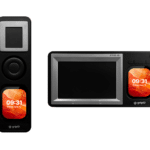Aerendir’s new mobile phone puts biometric authentication in users hands

A new mobile device from Aerendir Mobile and Reeder aims to “invert the relationship between cloud and edge” through the use of neurophysiological authentication. A press release says the Aura Mobile smartphone system integrates Aerendir Mobile’s NeuroPrint technology directly into mobile devices without relying on cloud-based systems. Combined with hardware from Reeder and Jolla Sailfish’s secure OS, it promises cloudless AI and “unhackable biometrics.”
According to the firm, the Aura system measures microvibrational patterns in a user’s hand for authentication. Because of human physiology, neural signals exhibit distinct patterns that are resistant to replication or spoofing. Dr. Martin Zizi, CEO of Aerendir Mobile Inc., says that “with NeuroPrint, your neural signals become the key – impossible to clone, steal, or spoof. No more passwords or scanners. Just hold your phone; your body does the rest.”
The company says its physiological biometric authentication offers greater privacy, safety and user control. Zizi makes the claim that, “unlike facial recognition, fingerprints or passwords, this technology ensures that only you can unlock and control your device.” Live user verification prevents AI bots, deepfakes and other bad actors from hijacking logins. And because authentication is cloudless and performed on-device, it is immune to data breaches.
The company goes further than rejecting the cloud: it wants to replace it. Per the release, Aura “has a vision for mobile technology and IoT: replacing the cloud with the Mist. Unlike cloud-based systems which can leave data vulnerable to hacking, censorship and AI exploitation, the Mist is expected to create a private, local ecosystem of connected devices.”
The announcement is in keeping with Aerendir Mobile’s mission to allow people to use biometrics to establish trust, without forcing them to share sensitive data.
Suffice it to say, Dr. Zizi is not exaggerating when he calls Aura “a significant departure from the status quo.” He says that, “designed to empower users, protect digital identities and redefine mobile security and safety, this smartphone stands as a statement against data exploitation.”
Aura is set to launch in summer of 2025.
Article Topics
Aerendir | biometric authentication | data privacy | edge computing | mobile device | smartphones








Comments